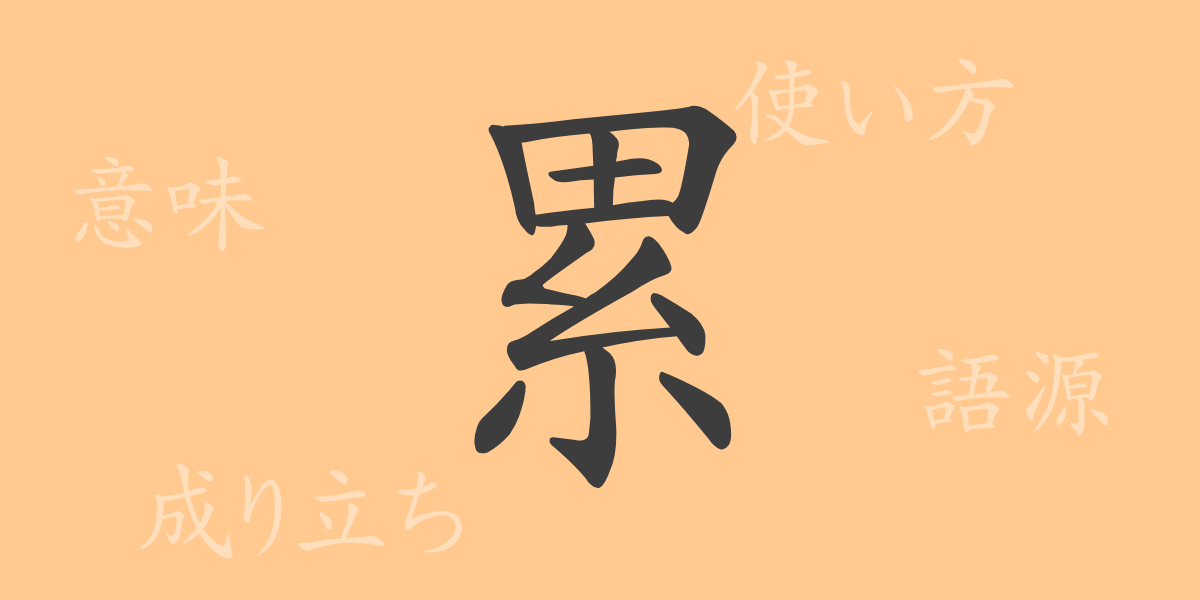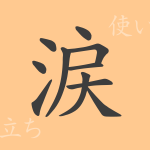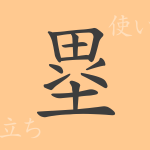The richness of the Japanese language is largely shaped by its complex and profound kanji (かんじ, Chinese characters) culture. One of the 常用漢字 (じょうようかんじ, commonly used kanji) is “累” (るい, rui), which weaves many stories through both its form and meaning. In this article, we will unravel the origins, meanings, uses, and even the idioms and proverbs that feature the kanji “累” (るい, rui). Let’s delve into the world of “累” (るい, rui) and feel the history and culture embedded in each character.
The Origin of 累 (るい, Rui)
The kanji “累” (るい, rui) is a character that originated in ancient China. It initially derived from a pictograph that represented binding with a rope. This depiction of bundling something with a rope evolved to signify “piling up” or “accumulating.” Over time, it further developed to include abstract meanings such as “relating to” or “connecting.”
The Meaning and Usage of 累 (るい, Rui)
The kanji “累” (るい, rui) carries the meanings of “piling up” and “accumulating.” Additionally, it can mean “relating to” or “involving.” In some contexts, it also conveys negative aspects like “being tired” or “troubled.” For example, “累積” (るいせき, ruiseiki) refers to accumulated numbers, while “連累” (れんるい, renrui) means “related to” or “involved with.”
Reading, Stroke Count, and Radical of 累 (るい, Rui)
The reading and components of the kanji “累” (るい, rui) are crucial for its use.
- Reading: On’yomi (おんよみ, Chinese reading) is “ルイ” (るい, rui); there is no Kun’yomi (くんよみ, native Japanese reading)
- Stroke count: 13 strokes
- Radical: 糸部 (いとへん, itohen, thread radical)
Idioms, Proverbs, and Compounds Featuring 累 (るい, Rui)
Idioms, proverbs, and compounds that include “累” (るい, rui) are frequently encountered in the Japanese language. For instance, “累積” (るいせき, ruiseiki) means accumulated total, and “累計” (るいけい, ruikei) refers to the cumulative total. “連累” (れんるい, renrui) signifies being involved in something, while “累進課税” (るいしんかぜい, ruishinkazei) describes a progressive tax system where the tax rate increases with higher income. These idioms and compounds reflect the meanings of “piling up” and “relating to” inherent in the kanji “累” (るい, rui).
Conclusion on 累 (るい, Rui)
The kanji “累” (るい, rui) possesses a wide range of meanings and uses within the Japanese language, illustrating the richness of Japanese words. Starting from a physical act of bundling, this character has evolved over time to encompass various abstract meanings. By understanding the idioms and proverbs used in daily life, we can deeply appreciate the meanings of “累” (るい, rui) and enrich our use of the language.

























